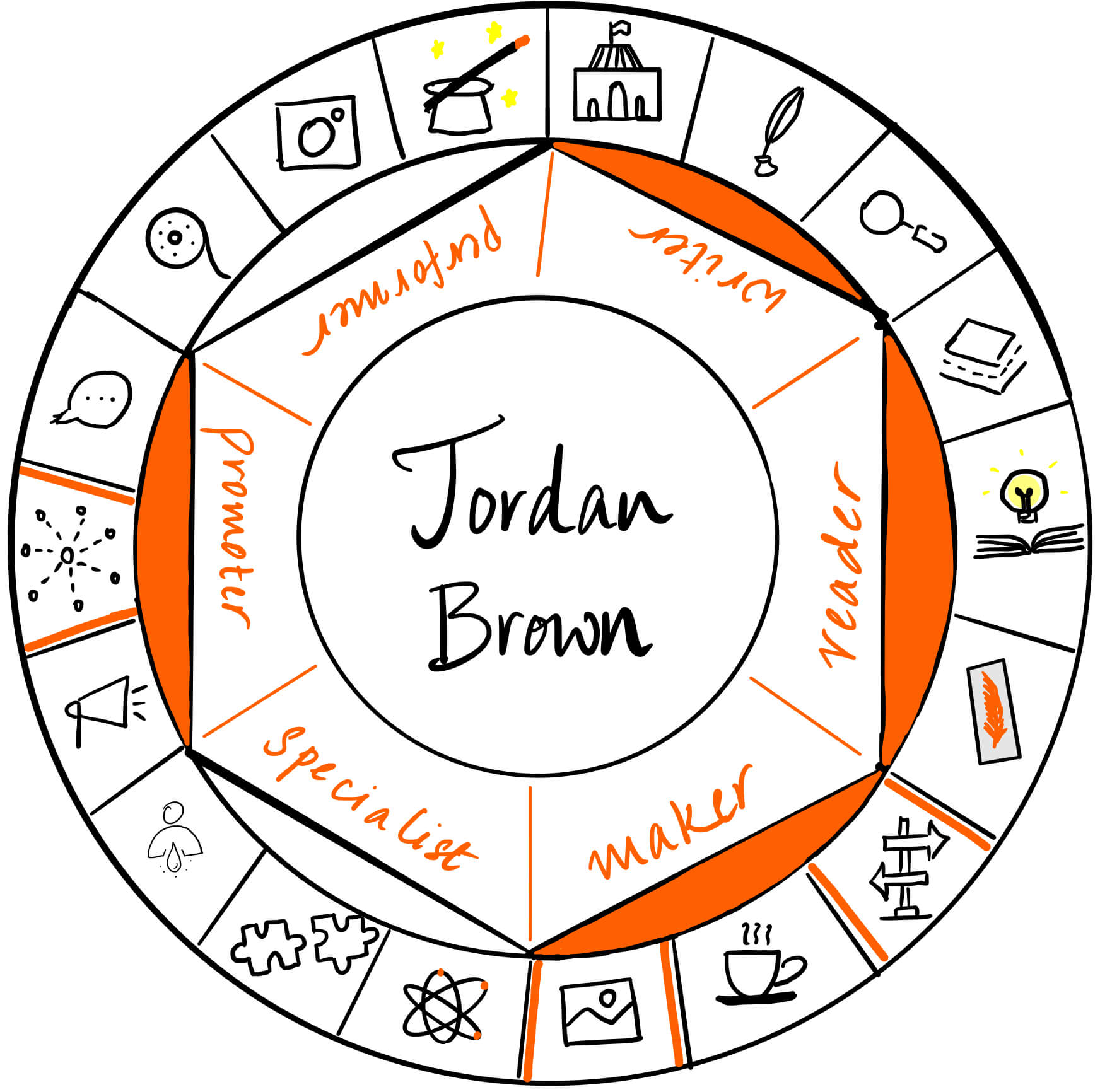
I have been following Jordan Brown for at least a couple months now. He often posts about mental health, asking the Twitterverse about their mental health and wellbeing. In these stressful times when people are losing jobs, businesses are getting shut down and we are all weathering panic and huge changes in personal and professional lives, I reached out to Jordan to learn more about mental health.
Jordan, welcome to Creator’s Roulette. How long have you been an advocate for mental health awareness and what inspired this journey?
I guess it all started when I sought out help when my mom was experiencing a mental health crisis that started back in 2007. It progressively worsened over the years, and I was forced to make the difficult decision to take her to the hospital in 2009. There were several rocky years after that, and I contacted the Helena, MT chapter of the National Alliance on Mental Illness (NAMI) for support.
I took the free, 12-week Family-to-Family course, and it changed the trajectory of my life. The average age was about 50 in that group of 20 or so people. I initially felt that I wouldn’t have much to offer about my family’s experience but soon realized that I had a knack for guiding families through their struggles. After I completed the course, I ended up getting trained to facilitate the course myself. I co-facilitated the Family-to-Family course with another guy for two years. We were one of the only all-male facilitator-pairs in the country.
It was volunteering with NAMI that convinced me to switch careers to mental health and, years later, pursue a master’s degree in social work.

Thank you for sharing, Jordan. I am glad you found a way into the careers that you are suited for and passionate about. You are a coach and social worker. How have these professions enhanced your work in the Mental Health movement?
It’s funny, I’m not actually doing either one as a job right now. After working in the mental health field for years, and after getting a master’s degree in social work, I realized that I could have a greater impact outside of the system rather than within it. After getting a graduate degree in Virginia, my wife and I followed our hearts to move back to Montana, which is the only place that has truly felt like home. I love my family, but I feel that I have a spiritual connection with Big Sky Country.
I’ve learned over the years that I’m more an introvert than an extrovert, but I’m absolutely an empath, through and through. I can feel other people’s emotions. It can make for an effective support group or work group, but it’s also unbelievably draining if I’m not careful.
That being said, friends and family have always naturally opened up to me about what they’re struggling with. I crave meaningful conversations, and I’m a natural helper. So, when I started to develop a presence on Twitter and people started coming to me for answers, starting a coaching side gig was a way I felt I could be of service. I’ve also always had a service-based mindset, and I love thinking in systems and processes. It’s probably why I gravitated to social work, which is very systems-oriented.
The social worker and coaching mindsets are ways of life for me. I don’t believe I have all the answers. Other people know their lives best. If I have experiences that benefit others, then great. I think all people already have the answers they need; sometimes they just need to feel heard and be guided through varying perspectives until they figure out what works best for them as individuals. This kind of empathetic leadership is badly needed in the world, and that’s what I hope to model through this new kind of mental health movement.
I have never thought about this before but what you said here reminds me of my recent experience with a counselor and the way in which he was able to guide me to come up with action based on all I had told him and how I felt. Being able to guide someone, listen to them, to ask questions that expose new ideas while not being invasive, are amazing qualities that take a lot of effort to develop.
On Mental Health Today
With COVID-19 spreading rapidly and national economies taking a hard hit, we need resources to regulate our mental health more and more. Your newsletter is a great resource. What are some organizations and people that you find particularly informative and would recommend we follow?
Great question. I really spend a lot of time trying to figure out if a person or organization is providing consistent, quality information. Doing enough research to see if a source can be trusted is crucial, in my opinion. I’m a huge fan of Shane Parrish and the work he does with Farnam Street. His work focuses on mental models, which are frameworks that can be used to live a fulfilling, more thoughtful life. I look for information that is timeless and useful in a variety of contexts.
I’ve also been really impressed with the email newsletters from Axios. They give me faith that journalism can still work in a modern, relevant, and effective way. For a different kind of daily email, I’d recommend Ryan Holiday’s Daily Stoic newsletter. The Stoic philosophy has fundamentally changed how I approach my life, and it plays a major role in my ongoing mental health. Anything can happen at any time. All we can do is control how we respond.
Finally, I’ve been a Tim Ferris fan for years. Whether you like his style or not, you can’t deny that he built a movement of people rethinking and redesigning the way they live their lives.
I have been meaning to learn more about mental models for a while now (Super Thinking by Gabriel Weinberg has been on my reading list since it came out), and know of Tim Ferris. Friend of mine loved his book about mentors. Can you tell us a little more about mental models and what are they exactly? How can they be of help at this time? I look forward to checking Shane Parrish’s work and the others you mentioned. Thank you for them!
I really encourage your readers to visit this page on the Farnam Street blog. It’s a great place to begin. There are quite a few mental models to explore, so I recommend that you and your readers start with the ones that capture your attention, and go wherever your interest takes you.
One that I have been thinking about recently is a model called Hanlon’s Razor. It states, and I’m quoting from the Farnam Street site: “Hanlon’s Razor states that we should not attribute to malice that which is more easily explained by stupidity. In a complex world, using this model helps us avoid paranoia and ideology. By not generally assuming that bad results are the fault of a bad actor, we look for options instead of missing opportunities.”

I have worked from home for a week now, and I can already feel a difference from prior weeks. I need something to look forward to and tracking some of my habits has really helped me stay focused. What are your suggestions for people to maintain and take care of their mental health at this time?
It all depends on a person’s unique situation, but here’s what I’d recommend. Avoid excessive news intake. Seriously. Don’t do it. Find a few, authoritative medical sources like Johns Hopkins or the CDC, but do not waste your time with mass media. It’s meant to generate strong emotions, not merely to provide quality information.
Then, develop a routine. That routine may look different now. I’m fortunate that I still have a job, and I can plan my weeks around that. But I also meditate almost every single day and go to bed and wake up at the same times every day. Consistency is huge.
That is definitely a big one to learn. For those of us who still have jobs and school, I am finding it is the rest of the time that has been drastically affected. For example, my commute used to be for reading audiobooks but without the commute, my audiobook intake has reduced. It feels like I am not reading much and many of my friends who are avid readers feel the same. It is also important to remember that routines take time to form and it is okay to not be able to do something at the same capacity as we used to, with everyone being at home or other obligations taking more time.
Finally, I think “social distancing” is the wrong phrase to use. We need social solidarity and physical distancing.
That’s a beautiful way to put it!
Social support is incredibly important for maintaining mental health. A lot of my family is getting into video calling software for the first time. They are doing massive Zoom calls, and they love it. I’m more of a one-on-one communicator. That comes back to the meaningful conversations piece for me. I recommend that folks do what they can to fit social support into their lives, however that looks to them. It could be a weekly phone call with a friend or reaching out to old friends via email. I’ve been reconnecting with lots of old friends, and that’s been so nice. This is an uncertain time, but it’s also a time that is bringing the world together.
Absolutely. Thank you so much for joining us for Creator’s Roulette, Jordan!
Thank you for having me! You’re doing a wonderful thing here.
What are some of your strategies for adjusting to new routines and taking care of your mental health?
Visit Jordan on his website or follow him on Twitter. If you are interested in his mental health newsletter, you can sign-up here.

Photo with breathe neon sign by Tim Goedhart on Unsplash
Mental Health block from Pixabay

Be First to Comment